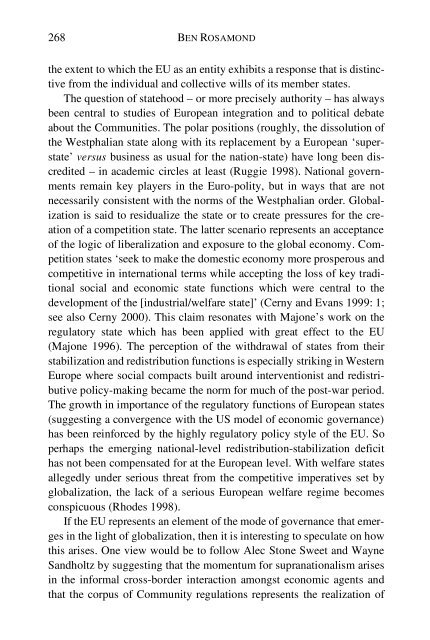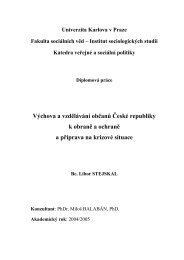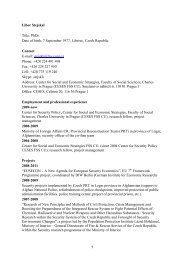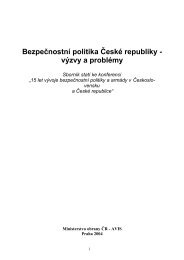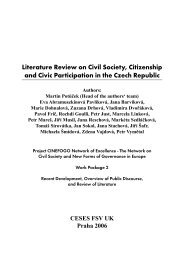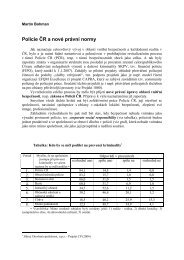Review Article: Globalization and Europeanization
Review Article: Globalization and Europeanization
Review Article: Globalization and Europeanization
You also want an ePaper? Increase the reach of your titles
YUMPU automatically turns print PDFs into web optimized ePapers that Google loves.
268 BEN ROSAMOND<br />
the extent to which the EU as an entity exhibits a response that is distinctive<br />
from the individual <strong>and</strong> collective wills of its member states.<br />
The question of statehood – or more precisely authority – has always<br />
been central to studies of European integration <strong>and</strong> to political debate<br />
about the Communities. The polar positions (roughly, the dissolution of<br />
the Westphalian state along with its replacement by a European ‘superstate’<br />
versus business as usual for the nation-state) have long been discredited<br />
– in academic circles at least (Ruggie 1998). National governments<br />
remain key players in the Euro-polity, but in ways that are not<br />
necessarily consistent with the norms of the Westphalian order. <strong>Globalization</strong><br />
is said to residualize the state or to create pressures for the creation<br />
of a competition state. The latter scenario represents an acceptance<br />
of the logic of liberalization <strong>and</strong> exposure to the global economy. Competition<br />
states ‘seek to make the domestic economy more prosperous <strong>and</strong><br />
competitive in international terms while accepting the loss of key traditional<br />
social <strong>and</strong> economic state functions which were central to the<br />
development of the [industrial/welfare state]’ (Cerny <strong>and</strong> Evans 1999: 1;<br />
see also Cerny 2000). This claim resonates with Majone’s work on the<br />
regulatory state which has been applied with great effect to the EU<br />
(Majone 1996). The perception of the withdrawal of states from their<br />
stabilization <strong>and</strong> redistribution functions is especially striking in Western<br />
Europe where social compacts built around interventionist <strong>and</strong> redistributive<br />
policy-making became the norm for much of the post-war period.<br />
The growth in importance of the regulatory functions of European states<br />
(suggesting a convergence with the US model of economic governance)<br />
has been reinforced by the highly regulatory policy style of the EU. So<br />
perhaps the emerging national-level redistribution-stabilization deficit<br />
has not been compensated for at the European level. With welfare states<br />
allegedly under serious threat from the competitive imperatives set by<br />
globalization, the lack of a serious European welfare regime becomes<br />
conspicuous (Rhodes 1998).<br />
If the EU represents an element of the mode of governance that emerges<br />
in the light of globalization, then it is interesting to speculate on how<br />
this arises. One view would be to follow Alec Stone Sweet <strong>and</strong> Wayne<br />
S<strong>and</strong>holtz by suggesting that the momentum for supranationalism arises<br />
in the informal cross-border interaction amongst economic agents <strong>and</strong><br />
that the corpus of Community regulations represents the realization of


